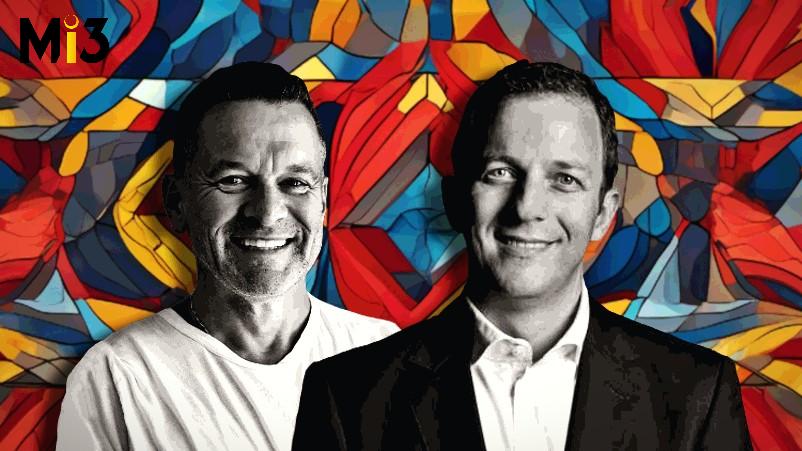‘The biggest pandemic is not Covid, it’s anxiety’: Former Pepsi, Westfield CMO, now board director John Batistich on leadership, resilience, self awareness and building Compadres

We kind of controlled nuclear weapons to an extent. We were slow on sustainability; we didn't really act on some of the harmful effects of social media, particularly amongst our teens … On AI, we can't afford to fail. I think it is potentially catastrophic in the way it could lead to a superclass.”
The #1 downloaded app in Australia last year was fashion retailer Shein and CMO-turned board director John Batistich says it’s just one in an armada of mind-numbing developments that business professionals and owners have to be across and to which personal resilience and future readiness is the only way to manage rising uncertainty and complexity.
Indeed, the most acute macro trend among humans – AI he says could be devastating if regulation is too slow – has implications spanning deep across society, civics and business and unprecedented levels of societal angst.
“The biggest pandemic in my view is not Covid, it’s anxiety,” Batistich told a Compadres forum of business founders and professionals, mostly from the marketing, media and entertainment sectors. “And it gives me anxiety. I see this in organisations and leaders, and it’s okay to call it – we all have it. For some people it become a disability. My wife is a school teacher and she has 28 kids in her class this year. She’s only got three that don’t need a personal learning plan.”
What does that mean? Well, six are diagnosed with a high degree of anxiety. Eight are diagnosed with ADHD, six are autistic.
“Do you realise that one in 11 boys between the age of nine and 11 are diagnosed with autism and on the NDIS. [National Disability Insurance Scheme]. What is happening? Are we just diagnosing around this? Is it as some governments call it the honeypot of money or is there something fundamentally changing?”
In context of business leadership and the the pace of change, Batistich says it’s creating “much anxiety and here is why I’m doing this: if we have conversations around the future, we’re more resilient – yes, we anticipated that’.”
Batistich says the new requirements for leadership include “wonderful self-awareness, adaptability empathy and resilience”.
No surprise though that AI was highest on Batistich’s radar for leadership opportunity, source of stress and careful deployment. It is “potentially catastrophic”, he warned, and regulation, the engagement of industry organisations and exec teams is central to not repeating previous ignorance of social media’s negative impact on teen mental health and wellbeing.
“In my mind, we kind of controlled nuclear weapons to an extent. We were slow on sustainability. We didn’t really act on some of the harmful effects of social media, particularly amongst our teens, particularly teenage girls.”
He said on AI, “we can’t afford to fail. I think it is potentially catastrophic in the way it could lead to a superclass. It could lead to the singularity that Ray Kurzweil talks to. The UK is probably the most advanced on the planet around some ethical considerations around AI … but you’ve also got dictatorships who are using it for control. I think we all have to lead because we see a future that could be dark, but also one full of opportunity.”
Under the darkest of scenarios, regulation and tight controls are urgent, “because this is going to be the biggest defining change in your life. It starts with industry associations. It starts with obviously, local members government. And then it looks at your organisation that you’ve been involved in.”
Batistich says Australia should look to the Europeans, not the US, for regulatory direction.
“I’m worried about the US political divide,” he says. “You’ve got a far right that wants to blow up everything in terms of compliance and regulation. I think the Europeans will lead.”
And that was a bit part of Batistich’s hour long tour de force.
Clive Burcham says these sort of “camp fires” are a core part of his Compadres mentoring program, which counts a private equity chairman in the UK and the founder of a booming Australian creator economy business in the network.
“The premise of Compadres is how do we lead, how do we realise our potential as individuals and parents and friends and business people whilst leading a rewarding quality of life,” Burcham says. “Because quite often we get trapped off track and there’s some pretty simple levers and methodologies that we can follow together to make sure that we do that.
“What I found in my own journey as a CEO is that there were times where my principals got off track and then everything else got off track – feeling lonely at the top and the bottom, sometimes losing my mojo, wondering whether I’m on the right track,’ is this my purpose? Is this my calling?’ There’s some of the things that I dealt with and therefore developed Compadres.”





